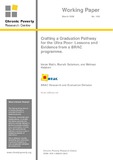| dc.description.abstract | The ultra poor are caught in a below-subsistence trap from which it is difficult for them to
break free using available resources and mechanisms. Time is not an ally for the ultra poor,
as things generally do not get better for them over time. More often than not, ultra poverty
tends to be chronic and intergenerational. Existing development approaches largely do not
work for the ultra poor and consequently, they tend to be left out. The ultra poor rely largely
on informal charities, having its own rules of inclusion and exclusion based on complex
systems of patronage. More importantly, such informal support tends to at best reproduce
mere subsistence and does not provide a graduation pathway for the ultra poor. Social
assistance programmes typically provide a period of relief through food and/or cash, but
these too tend to focus less on graduation and more on immediate needs. In this paper, an
innovative approach that BRAC has been experimenting with since 2002 to craft a
graduation pathway for the ultra poor is described. Based on experiences of implementing
this approach and evaluation research, a number of key lessons for the broader thinking on
tackling ultra poverty are drawn. | en_US |

